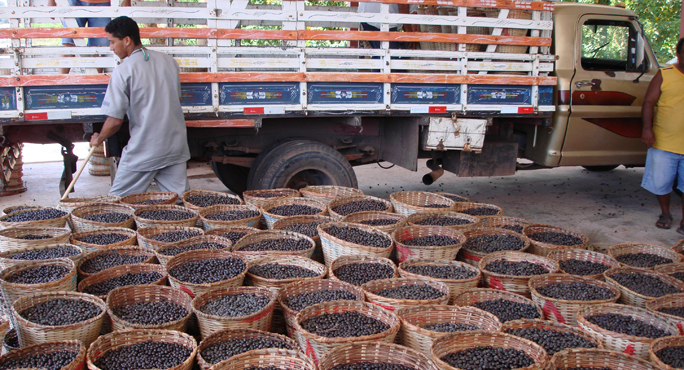Freshly picked Acai, Brazil. Photo by Chris Kilham
It seems so long ago that I first tasted acai—a rich, purple palm fruit in the Amazon. I was living with Ipixuna indians on the Amazon river in Brazil, and some of the women in the family I was staying with made a bowl of thick purple fruit. I was hooked. Over the course of my first month in the Amazon, I ate acai several times, and learned to love the flavor and texture—think chocolate berries. When I departed Brazil back then in 1997, I wondered if I would ever see acai in the U.S.
Today acai (Euterpe oleraceae) is a bloodied and wounded survivor of American marketing gone wild. A highly nutritious fruit, acai comes from a palm tree, and is harvested in great strands. Acai fruits are not technically berries. Instead, they are pitted fruits known as drupes. But unlike other foreign fruits that gain traction in other markets, acai has had the power of exposure on Oprah, inclusion in a best-selling beauty book by Dr. Nicholas Perricone, and other high-profile people touting its benefits. And the results? Disastrous.
As a purple fruit, acai is loaded with the purple pigments called anthocyanins. These powerful antioxidants are protective in the body, helping to reduce the premature aging of cells.
Additionally, they also possess anti-inflammatory activity. This is why Germany’s Bundesforshungsanstaldt (think FDA) is investigating anthocyanins for reducing inflammation in cases of inflammatory bowel disease. The anthocyanins in acai also appear to enhance energy, and to impart a feeling of well being. X-gamers and surfers, skateboarders and other athletes have taken to acai, and it is a sports crowd hit. Acai fits seamlessly with an active lifestyle, drunk in smoothies, eaten in bowls of granola, and drunk as juice.
Sadly, acai the super fruit is also a darling of opportunistic marketers. While acai provides income to many thousands of harvesters in Brazil, it also provides fodder for hucksters who don’t really care about nutrition or the Amazon rainforest, but have their eyes focused solely on dollars. And with acai, the dollars have rolled in liked a tsunami.
In the past several years, a highly dilute and questionably beneficial drink of acai has sold through a multi-level-marketing scheme to the tune of two billion dollars in total sales, at over forty dollars per bottle. That’s a far cry from the fifty cents you pay for a big bowl of pure, fresh acai in Brazil. Even worse, a number of credit-card frauds have sprung up with acai as a “diet” product, promising extreme weight loss in a short period of time. Intensive marketing of acai as a diet agent has radically boosted sales of virtually useless acai-based weight-loss supplements, and has fueled the ire of credit card holders who can’t stop the automatic payments for ineffective acai diet pills. In other words, acai has become a victim of its own success, feeding society’s predatorial bottom-feeders.
So what has happened here? Acai is a great food. It is delicious, great tasting, loaded with potent antioxidants, and makes you feel good. And this has whipped up marketers into a frenzy. Hundreds of thousands of pop-up internet ads have declared acai the great diet aid, and now many dozens of acai-based pills litter the market. But acai is not a weight loss product, and nobody is going to go from fat and tired to slender and energized as a result of taking these products.
But acai is different from the other so-called super fruits. How? Its harvesting, and its success, can help to reduce the devastation of the Amazon rainforest. Acai palms grow abundantly in Eastern Brazil, and where they grow, the trees are not cut down. This is because acai harvesting is much more profitable than cutting down the trees for timber. Right now, a couple of hundred thousand acres of rainforest are protected as a result of acai harvesting. Additionally, tens of thousands of Brazilian families make a living harvesting acai. This means that they do not have to move to cities and become chamber maids and bus-boys in someone else’s dream.
So how to best use acai? Eat it. Drink acai smoothies, enjoy acai sorbet, and incorporate acai into your diet the way you would strawberries or peaches. Would you eat a sandwich pill to lose weight? Of course not. It’s the same with acai. Don’t fall for the hustle. But at the same time, let’s recognize acai for what it is, a highly nutritious and unusually great-tasting Amazonian fruit with the power to employ many and help to protect the greatest rainforest on earth.
Sambazon - Power Scoop Organic Freeze Dried Acai Powder Drink Mix
Chris has received numerous requests to recommend a specific Acai product. We are providing a link to an Acai product available online. You can also find Sambazon Acai in the frozen section of Whole Foods Market and other Natural Retailers. We personally know, love and trust the people behind this brand. If you do end up purchasing products based on our recommendation, please let the customer service representatives know we sent you. Thanks so much, and enjoy in good health!


